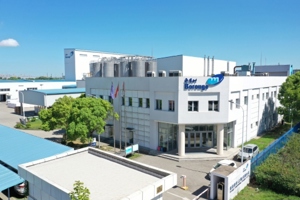Borouge & Borealis unveil auto products made of 70% recycled materials
Borouge PLC, a leading petrochemical company that provides innovative and differentiated polyolefin solutions, and Borealis, one of the world’s biggest polyolefin manufacturers, today announced the launch of two new sustainable polymer products for the automotive industry, in line with both companies’ sustainability drive. Made from up to 70% recycled materials, these are the first sustainable products developed at Borouge’s Compounding Manufacturing Plant (CMP) located in Shanghai, China, which recently received ISO 14067 certification for carbon footprint assessment.
Rainer Hoefling, Chief Executive Officer, Borouge Pte Ltd., said: “The launch of our latest products signals our strong commitment to sustainability. By using recycled materials, and developing products with a lower carbon footprint, we demonstrate how circular economy goals are achievable with tangible results today. We are proud of the relentless efforts and talent of our team, who embrace sustainability and ensure that our innovative solutions enable the rapid transition of the automotive industry towards a lower carbon footprint.”
The new polypropylene (PP) solutions, made from up to 70% post-consumer recycled (PCR) materials, have undergone ISO 14067 carbon footprint assessment certified by TÜV Rheinland*, covering the products’ entire life cycle (from cradle to gate). These new grades reduce carbon emissions and energy consumption while delivering similar performance and consistent quality as original virgin compounds. The high PCR polymer content in these compounds supports the need to increase circularity and optimizes the use of precious natural resources.
The first solution, GD3565SYC, is a glass fibre reinforced polypropylene, containing 50% PCR, offering unprecedented performance, easy processability and excellent long-term heat resistance. With these properties, the product is considered ideal for under-body shields, bumper brackets and structural parts in cars. This grade reduces the carbon footprint by about 28% compared with virgin grades and can replace current virgin grades at Borouge's CMP without affecting quality standards.
The second solution, ED0701SYC, is an un-filled PP grade free of talc or glass fibres designed for the manufacture of wheel arches and other exterior components and contains a mixture of up to 70% post-consumer polypropylene and polyethylene. This material reduces carbon footprint by 32% compared to virgin grades while offering a perfect balance between impact strength and stiffness. Coupled with good processability and stability, the grade offers good surface quality for exterior applications.
Eddie Wang, Senior Vice President, Asia South at Borouge, said: “The rising demand for innovative mobility solutions has underscored sustainability as a crucial focal point for the automotive industry. In response, our customers are actively seeking ways to integrate sustainable polyolefin solutions into their latest car models. At Borouge, we relentlessly innovate to create products that deliver multiple advantages to our clients while empowering their rapid transition to a sustainable future.”
Since the inauguration of the CMP in 2010, Borouge has been developing high quality compounds for mobility applications, providing testing support for automotive customers. The CMP is equipped with state-of-the-art laboratories and cutting-edge instruments for new product development. Starting with 50,000 t/y in 2010, the plant currently has an annual capacity of 90,000 tonnes, highlighting an 80% growth in capacity.







Comments